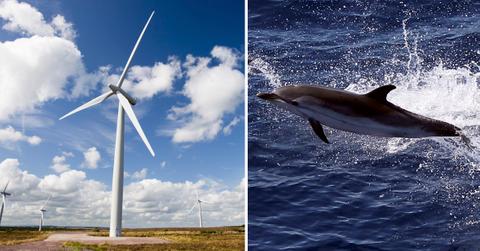Positive Climate Stories From This Month to Remind You It’s Going to Be OK
Here are five stories about the planet to remind you that there is light in the darkness.
Updated March 16 2020, 4:53 p.m. ET

Ever since the World Health Organization (WHO) declared COVID-19 as a pandemic this week, people all over the world have been practicing social distancing to help prevent the spread of the novel coronavirus. So that means more of us are sitting home, free to scroll through the internet and consume a neverending stream of ominous news reports, op-eds, and even memes about the coronavirus.
It's important to stay informed — but it's just as important to offset fear by remembering that there are a few good things happening in the world right now, too. So to remind you of that, we rounded up five of this month's positive climate-related news stories.
1. Luxembourg Makes All Public Transportation Free
As of Feb. 29, public transport across Luxembourg is free of charge to all of the country's residents, commuters, and tourists. The move makes Luxembourg the first country in the world to institute free public transportation nationwide.
Not only does this help those who already rely on Luxembourg's buses, trains, and trams save on the monthly expense of buying tickets, but it could also help reduce the Grand Duchy's emissions, since it may incentivize people to take public transport instead of driving their cars.
"The ecological aspect of the measure could have a positive impact on the environment by attracting new users to public transport while minimizing carbon emissions thanks to fewer cars on the road," said Luxembourg's government.
2. NO2 Emissions Down in Certain Regions
Coronavirus outbreaks have caused various cities, regions, and countries all around the world to institute official lockdowns. During lockdowns, there are drastically less cars on roads, less businesses open, and overall, less fossil fuels being burned. Over the past few weeks, scientists have observed reductions in nitrogen dioxide (NO2) pollution in the atmosphere across certain regions of China and northern Italy, which have both been on lockdown.
According to NASA Earth Observatory, NO2 concentrations in the atmosphere all across China have been down since January. And more recently, the European Space Agency reported that NO2 emissions have dropped over northern Italy for the same reason.
Of course, the COVID-19 pandemic is a terrifying and very real threat to humanity. The positive thing here is that we now have even more evidence that simply burning less fossil fuels can immediately and significantly reduce air pollution.
3. SeaWorld San Diego May Close
California Senator Cathleen Galgiani (D-Stockton) recently introduced the Dolphin Protection Act, which would protect all cetaceans (whales, dolphins, and porpoises) from being bred, held in captivity, used for entertainment, and more across the state of California. Should the bill, aka Senate Bill 1405, become law, it would effectively shut down SeaWorld San Diego, where cetaceans are kept in captivity, forcibly taught tricks, and required to live in ways unnatural to their species.
“We should not rely on cruel and inhumane treatment of any creature simply for our entertainment,” said Galgiani. “Dolphins are incredibly intelligent beings that suffer a range of health problems and stress as a result of being held in captivity.”
4. The Climate Strikes Go Online
Even though she's staying home, Greta Thunberg is not stopping her climate strikes. On Friday, Mar. 13, the 17-year-old climate activist encouraged students to take their regular Fridays for Future strike from the streets and bring it inside with a #ClimateStrikeOnline.
Many students all around the world have been inspired by Greta, and have skipped school in favor of striking in front of government buildings on Fridays over the past year and a half. But now, Greta could actually bring a resurgence of visibility to the movement by getting the hashtag trending on Twitter for the next few Fridays.
5. CO2 Power Sector Emissions Significantly Dropped in 2019
According to a new report conducted by independent climate think tank Ember, in 2019, global CO2 power sector emissions went down by 2 percent. As per the report, this is the largest reduction the world has seen since 1990, when trends on this matter were first reported.
In large part, this shift is because is thanks to the U.S. and the EU increasing their reliance on renewable energy and natural gas, and slowly shifting away from fossil fuels. While natural gas still emits about half as much carbon as coal does, renewable energy (from solar to wind to hydro) produces even less.
To continue reducing worldwide emissions and to achieve the goals of the Paris Agreements, many experts believe we need to transition the global power grid to sources of clean energy — and as the new data from Ember shows, doing so really works.
The best way to prevent contracting or spreading coronavirus is with thorough hand washing and social distancing. If you feel you may be experiencing symptoms of coronavirus, which include persistent cough (usually dry), fever, shortness of breath, and fatigue, please call your doctor before going to get tested. For comprehensive resources and updates, visit the CDC website. If you are experiencing anxiety about the virus, seek out mental health support from your provider or visit NAMI.org.